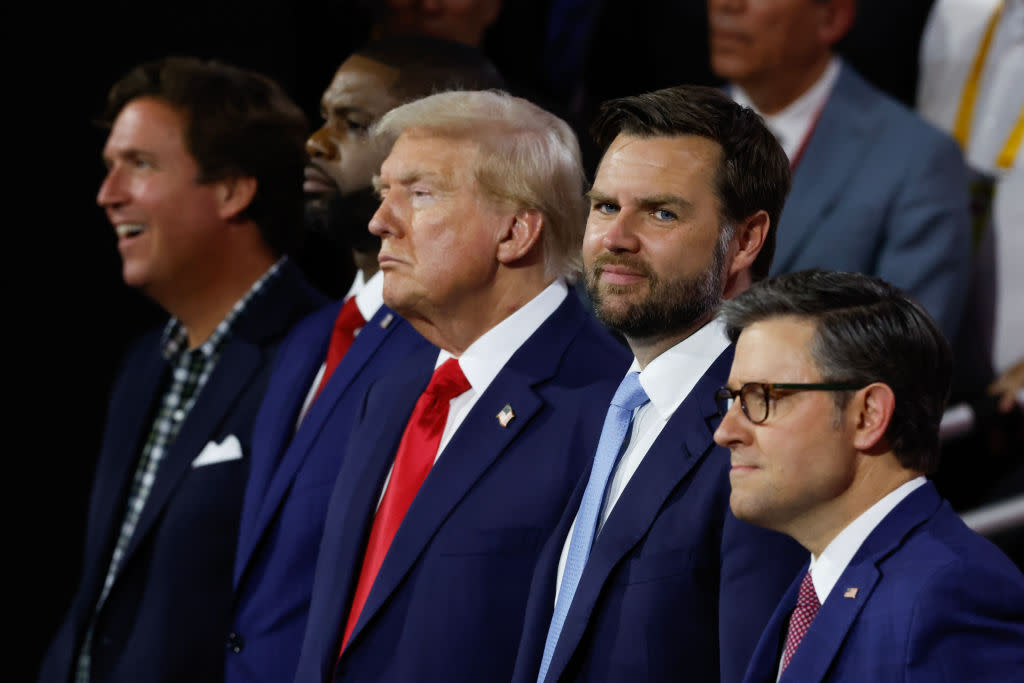Ohio advocates seek to ‘Trump-proof’ recent gains made on clean energy and climate

MILWAUKEE, WISCONSIN - JULY 15: (L-R) Tucker Carlson, U.S. Rep. Byron Donalds (R-FL), Republican presidential candidate, former U.S. President Donald Trump, Republican vice presidential candidate, U.S. Sen. J.D. Vance (R-OH), and Speaker of the House Mike Johnson (R-LA) appear on the first day of the Republican National Convention at the Fiserv Forum on July 15, 2024 in Milwaukee, Wisconsin. Delegates, politicians, and the Republican faithful are in Milwaukee for the annual convention, concluding with former President Donald Trump accepting his party's presidential nomination. The RNC takes place from July 15-18. (Photo by Chip Somodevilla/Getty Images)
Advocates in Ohio are stepping up their clean energy efforts in response to the Republican party platform and Project 2025, which detail how a second Trump administration would promote fossil fuels while cutting back federal programs for addressing climate change, environmental justice and equity.
Over the past year, Ohio-based governments and groups have won awards for hundreds of millions of dollars under the Inflation Reduction Act and the Bipartisan Infrastructure Law.
Federal policy takes on added significance in a state like Ohio, where lawmakers have already placed extra hurdles in the way of clean energy development. That has left it up to local governments and private organizations to take the lead in cutting greenhouse gas emissions.
Some of that work did move ahead during the former Trump administration, said Mike Foley, director of sustainability for Cuyahoga County, which includes Cleveland. But, “we had to scramble and struggle to get projects done.”
“Having resources from the federal government makes things so much easier,” Foley said.
Just this week, for example, the Environmental Protection Agency announced a grant of roughly $129 million to a partnership among Cuyahoga County and the cities of Cleveland and Painesville to build a 35 megawatt solar power facility and 10 megawatts of battery storage, and to shut down a coal-fired power plant.
Earlier in July, the Federal Transit Authority awarded a $10.6 million grant under the Bipartisan Infrastructure Law to the Greater Cleveland Regional Transit Authority for ten electric buses and chargers for low-income, high-ridership areas. More than $40 million will go to other projects in Ohio.
“These dollars are changing communities for the better,” said Chris Tavenor, general counsel for the Ohio Environmental Council Action Fund.
Project 2025 — a policy blueprint for a possible Trump presidency produced by the Heritage Foundation — calls for repealing the Inflation Reduction Act and Bipartisan Infrastructure Law, threatening funding for additional work in Ohio and elsewhere, as well as weakening environmental protections and programs to promote equity. While former President Donald Trump has distanced himself from Project 2025, he has multiple links to authors and editors of the roughly 900-page report, and has repeatedly pledged to end Biden energy policies he has dubbed the “green new scam.”
“This is getting rid of everything that’s moved the needle forward on climate and energy,” said Neil Waggoner, the Midwest manager for the Sierra Club’s Beyond Coal program.
While it’s unclear whether who will win in November, advocates are nonetheless preparing for a potential Trump presidency now.
Maximizing gains
The GOP platform and Project 2025 make clear what types of energy policies to expect if there’s a change in administration, said Melinda Pierce, legislative director for the Sierra Club.
“It’s in black and white,” Pierce said. So now, the Sierra Club is focusing on how to “Trump-proof the gains we have made.”
One push is to help local officials identify and apply for funding opportunities that are available now. “We don’t want to leave that money on the table,” Pierce said, adding that once money is in hand it “buys a lot of goodwill and inertia.”
That goodwill might limit the extent to which federal lawmakers would scale back programs bringing money to their states, according to conservative clean energy advocates who met at the Republican National Convention last week. Others are also collaborating with partners to get money for projects in hand as soon as possible.
“We are taking a proactive approach to reach out to funders to secure funding to continue the work and advocacy for energy, climate and environmental justice,” said SeMia Bray, co-leader for Black Environmental Leaders, which collaborates with regional partners to provide resources and support for environmental and economic justice initiatives.
Jonathan Welle, executive director for Cleveland Owns, said his organization plans to apply this summer for a “substantial federal grant that would put money in the hands of longtime northeast Ohio communities, specifically Black and Brown communities, so they can chart their own energy future.”
Welle said he’s not at liberty to discuss the proposed project’s details, but did say the group expects it would hear about grant awards late this year or in early 2025.
“But the timing for that and the follow through from the federal government…is highly dependent on the next few political moves, including November’s election,” he added.
Work to secure federal funding didn’t just spring up overnight, though. The Reimagine Appalachia coalition has been working for several years with stakeholders in Ohio, West Virginia, Kentucky and Pennsylvania to build capacity to absorb and direct that funding. Periodic information sessions spotlight funding opportunities and promote networking for local governments or others to develop ideas for projects. There’s even a forthcoming “grant of the month club” event.
“It’s really important to be doing this work and making sure that this current opportunity is taken advantage of,” said Amanda Woodrum, one of Reimagine Appalachia’s co-directors.
At the same time, she warned against speeding up the process too quickly.
“It takes time to put the infrastructure in place to actually direct it and make sure [funding] doesn’t go to the same old political channels,” Woodrum explained.
Going too quickly also increases the risk of backlash if projects aren’t well thought out, don’t provide what people in communities want, or otherwise fail.
“You don’t want it to go sideways,” Woodrum said. “You want to make sure you do it right.”
Getting the word out
Messaging is another top priority for advocates as the fall election draws near.
“We are continuing our efforts of voter education, making sure the communities we love and support have updated registration and understand the importance of this election, and all elections on the local level,” Bray said.
Volunteers for Save Ohio Parks have been trying to limit drilling and fracking under state-owned parks and wildlife areas since early 2023, and now face the possibility of more drilling and fossil fuel development under a possible Republican administration.
“Yet Save Ohio Parks is determined to stay positive and keep our eyes on the prize,” said Melinda Zemper, a member of the group’s steering committee. The group is expanding its volunteer base and building additional coalitions with other environmental groups in Ohio.
Advocates also want to get out the word about benefits from current federal programs so voters are aware of what’s at stake.
“The Ohio Environmental Council Action Fund will continue its work to emphasize how the Inflation Reduction Act, the Bipartisan Infrastructure Law, and other important federal programs benefit Ohio communities and help combat the causes of climate change,” Tavenor said. Without continued progress, climate change costs for Ohioans will get worse, he noted.
Messaging by the Sierra Club, Ohio Environmental Council Action Fund and other advocates also highlights the implications of Project 2025 for equity and democracy.
“Project 2025’s extreme proposals are specifically structured to benefit polluting industries at the expense of the health and environment of our communities,” Tavenor said. “Simply put, Project 2025 is a government takeover that threatens our democracy, designed by wealthy billionaires to benefit themselves and their power-hungry allies.”
This article first appeared on Energy News Network and is republished here under a Creative Commons license.

GET THE MORNING HEADLINES DELIVERED TO YOUR INBOX SUPPORT NEWS YOU TRUST.

